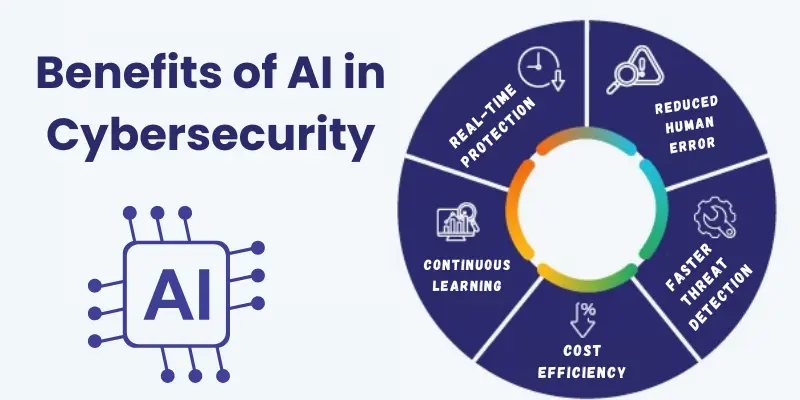How AI is Transforming Cybersecurity: A Simple Guide for Everyone
Published: 20 Oct 2025
Cyber risks are increasing at a pace unprecedented in today’s digital age. Hackers are devising new methods to steal data, transmit malware, and attack systems. Traditional forms of protection are no longer sufficient. Here’s where the role of AI in cybersecurity becomes crucial.
AI detects risks, prevents assaults, and protects critical data automatically and in real time. From corporations to personal devices, AI is transforming how we safeguard our digital environment. In this article, we’ll look at how AI plays a critical role in cybersecurity and why it’s becoming increasingly important for everyone.
What is AI in Cybersecurity?
Artificial intelligence (AI) in cybersecurity refers to the application of artificial intelligence to defend computers, networks, and data against cyber attacks. It enables systems to automatically notice unusual behavior, evaluate trends, and respond to threats in real time. Unlike traditional security solutions that rely on set rules or human monitoring, AI can learn from previous assaults and forecast upcoming threats, making defenses more intelligent and responsive.
For example, AI can detect questionable login attempts, malware, and phishing emails before they cause damage. In brief, AI functions as a clever digital guard, continually monitoring and safeguarding systems to keep data secure without requiring constant human supervision.
Key Functions of AI in Cybersecurity
AI is transforming cybersecurity by making systems smarter, faster, and more efficient at protecting data. Here are the key features that show how AI strengthens digital security:
- Threat Detection and Prediction: AI analyzes vast volumes of data to detect unusual activity and forecast future cyber assaults before they occur, ensuring system security in real time.
- Automated Response: When a danger is discovered, AI may take quick action to prevent attacks or reduce damage, decreasing the need for human participation.
- Activity Analysis: Artificial intelligence watches user and network activity to detect abnormal behaviors that might signal hacking attempts or illegal access.
- Malware and Virus Protection: Artificial intelligence continually checks for malware, viruses, and other dangerous software to prevent infestations from spreading.
- Fraud Detection: AI can identify anomalous transactions or login habits, assisting organizations and people in preventing fraud.
- Continuous Learning: AI systems learn from previous attacks, allowing them to better manage new and developing threats over time.

Benefits of AI in Cybersecurity
AI is transforming how we defend our digital world. It not only detects cyber threats but also enhances system security by making it quicker, smarter, and more dependable. Here are the main benefits of using AI in cybersecurity:
1. Faster Threat Detection
AI can scan massive volumes of data in seconds, detecting unusual behaviors or potential cyberattacks that humans may overlook. Data breaches and sensitive information are prevented via early detection of threats. This speed enables enterprises to respond fast and minimize any damage. Faster detection keeps systems safe and secure at all times.
2. Reduced Human Error
Manual monitoring of cybersecurity systems can lead to mistakes due to fatigue or oversight. AI continuously monitors networks and user behavior with high accuracy, minimizing these risks. By reducing human error, AI ensures that no threats go unnoticed and strengthens overall system security.
3. Real-Time Protection
Instead of waiting for human action, AI responds to cyber threats in real time. It can quickly stop unusual activity, halt malware transmission, and safeguard critical data. Real-time security keeps organizations and individuals secure from attack around the clock.
4. Cost Efficiency
AI automates many routine cybersecurity procedures that would otherwise need massive teams of professionals. This not only saves time but also lowers operating expenses for enterprises. By automating processes, AI allows human specialists to focus on more complicated security challenges.
5. Continuous Learning
AI systems learn from previous assaults and improve over time, growing better at avoiding and blocking new threats. This adaptive skill enables firms to remain ahead of emerging cyber-attacks. Continuous learning guarantees that cybersecurity measures are still effective even as hackers discover new approaches.
Challenges of Using AI in Cybersecurity
While AI greatly improves cybersecurity, it is not without its challenges. Organizations need to be aware of these limitations to use AI effectively and maintain strong protection against cyber threats:
1. High Initial Costs
Implementing AI-powered cybersecurity solutions may be costly, particularly for small and medium-sized enterprises. It necessitates investment in cutting-edge software, technology, and professional workers. While AI improves security, the initial expenses might be prohibitive for certain enterprises.
2. False Positives and Negatives
AI systems may sometimes classify safe activities as threats (false positives) or miss real attacks (false negatives). This can affect the accuracy and reliability of cybersecurity measures. Human monitoring is often needed to ensure the system works correctly
3. Dependence on Quality Data
AI relies on a significant quantity of precise and up-to-date data to successfully detect cyber threats. Poor or insufficient data can impair the capacity to accurately identify assaults. Maintaining high-quality data is critical for AI to work optimally.
4. Ethical and Privacy Concerns
AI continually analyzes user and network activities, raising privacy and ethical problems. Organizations must carefully manage data collection, storage, and utilization. Balancing security and user privacy is a major difficulty in AI cybersecurity.
Real-World Applications of AI in Cybersecurity
AI is not just a concept; it is actively used in many industries to protect data and systems. For example, in healthcare, AI safeguards sensitive patient data and detects unauthorized access. You can explore the role of AI in healthcare to see how similar AI technologies are saving lives and improving patient care.
1. Banking and Financial Services
Artificial intelligence is commonly utilized in banks to detect fraud and questionable transactions. It analyzes account activity in real time and identifies suspicious conduct, lowering the likelihood of financial crimes. This protects consumer accounts and financial systems from hackers.
2. Healthcare Industry
Hospitals and healthcare organizations use AI to secure sensitive patient information. AI detects unauthorized access, protects medical records, and defends against ransomware attacks. This ensures that patient data remains confidential and safe
3. Government and Defense
Governments rely on AI to detect and prevent cyberattacks on key infrastructure. AI monitors large networks for odd behavior and aids in the prevention of data breaches or attacks on defensive systems. This is critical to national security.
4. E-Commerce and Online Businesses
Online shopping platforms utilize artificial intelligence to prevent fraud and protect client payment information. AI technologies detect strange purchasing trends and stop illegal transactions immediately. This protects both companies and customers.
5. Corporate Networks and Enterprises
Large corporations utilize AI to monitor internal networks and staff behavior. AI identifies insider risks, phishing emails, and malware assaults before they propagate. This guarantees that company activities are secure and uninterrupted.
Future of AI in Cybersecurity
The future of AI in cybersecurity looks bright and promising. As cyber threats grow more advanced, AI will play a bigger role in keeping data and systems safe. Here are some key points about the future:
|
Conclusion
AI is changing the way we protect data and fight cybercrime. It makes threat detection faster, improves security, and reduces risks. However, it also brings challenges like high costs and the need for skilled experts.
The future of AI in cybersecurity looks bright. Smarter tools, automation, and human-AI collaboration will make systems stronger than ever.
Are you ready to embrace AI for better security? Start learning about AI tools today and protect your data before it’s too late!
Frequently Asked Questions [FAQs]
Have questions about how AI helps in cybersecurity? Here are some common questions with simple answers to clear your doubts:
According to Forbes, AI helps improve cybersecurity by making systems smarter and quicker. It detects cyber threats in real time and lowers the possibility of human mistake. AI use machine learning to scan massive volumes of data and detect suspect trends before an attack occurs. This proactive strategy enables businesses to anticipate attacks and respond fast, keeping their networks secure.
In summary, AI in cybersecurity focuses on threat detection, automated responses, and improved decision-making to provide more safety.
AI helps in detecting and preventing cyberattacks quickly. It analyzes large amounts of data to find threats in real time.
AI uses machine learning and behavior analysis to spot unusual activities. This helps in identifying attacks before they cause damage
There are many benefits to using AI in cybersecurity. Here are some of the key benefits:
- Faster Threat Detection
- 24/7 Monitoring
- Better Accuracy
- Predicting Future Attacks
- Handling Big Data
The future of AI in cybersecurity looks very promising because cyber threats are becoming more advanced every day. Here are the key points about the future:
- Smarter Threat Detection
- Automated Response
- Predictive Cybersecurity
- Better Protection for IoT Devices
- AI-Powered Security for Cloud Systems
- Human-AI Collaboration

- Be Respectful
- Stay Relevant
- Stay Positive
- True Feedback
- Encourage Discussion
- Avoid Spamming
- No Fake News
- Don't Copy-Paste
- No Personal Attacks

- Be Respectful
- Stay Relevant
- Stay Positive
- True Feedback
- Encourage Discussion
- Avoid Spamming
- No Fake News
- Don't Copy-Paste
- No Personal Attacks





